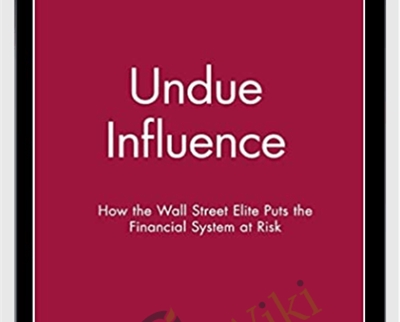Undue Influence. How The Wall Street Elite Puts The Financial System At Risk – Charles Geisst
$24.00
A critical look at over 80 years of conflict, collusion, and corruption between financiers and politicians
Undue Influence paints a vivid portrait of the dealings between "the few", in this case members of Congress, the banking community, and the Fed,
Description
Purchase Undue Influence. How The Wall Street Elite Puts The Financial System At Risk – Charles Geisst Course at eBokly. We actively participate in group buys and are committed to sharing knowledge with a wider audience. What's more, our courses maintain the same quality as the original sale page. You have the option to buy directly from the sale page at the full price (sale page link is provided within the post).
A critical look at over 80 years of conflict, collusion, and corruption between financiers and politicians
Undue Influence paints a vivid portrait of the dealings between "the few", in this case members of Congress, the banking community, and the Fed, and sheds light on how radical new deregulatory measures could be introduced by unelected officials and then foisted upon Congress in the name of progress. In the process, the background of the new financial elite is examined-because they are markedly different than their predecessors of the 1920s and 1930s. Undue Influence also brings readers up to speed on other important issues, including how the financial elite has been able to perpetuate itself, how the markets lend themselves to these special interest groups, and how it is possible that after 80 years of financial regulation and regulatory bodies the same problems of financial malfeasance and fraud still plague the markets.
Charles R. Geisst (Oradell, NJ) is the author of 15 books, including Wheels of Fortune (0-471-47973-X), Deals of the Century (0-471-26397-4) and the bestsellers Wall Street: A History and 100 Years of Wall Street. Geisst has taught both political science and finance, worked in banking and finance on Wall Street and in London, as well as consulted. His articles have been published in the International Herald Tribune, Neue Zurcher Zeitung, Newsday, Wall Street Journal, and Euromoney.
From Publishers Weekly
The Glass-Steagall Act, separating commercial banks from investment banks, was passed in 1933 to prevent banks from risking depositors' funds on the still-shaky stock market. It was repealed in 1999, when gambling other people's money on the stock market was considered the height of financial probity. In this engaging history of Glass-Steagall, Geisst (Wall Street: A History) surveys the 70 years leading to this ideological sea change, as the widespread Depression-era populist suspicion of Wall Street subsided, to be replaced with the pro-business dogma of the Reagan era and the New Economy bubble. Formal repeal, Geisst shows, was preceded by decades during which big commercial banks, hungry for a slice of the lucrative investment banking business, increasingly flouted Glass-Steagall restrictions with the connivance of ideologically sympathetic Federal Reserve regulators. The vast sums banks have spent on lobbying and campaign contributions, and the cushy Wall Street jobs awaiting government officials who switch sides, make Geisst wonder whether "the gamekeepers and the poachers had all joined the same club." Geisst provides a lucid guide to the financial issues involved and a colorful account of decades-long political debates and legislative wranglings, while raising troubling questions about the direction of public policy.
Copyright © Reed Business Information, a division of Reed Elsevier Inc. All rights reserved.
Review
"…incisive explanation of various consiracy theories" (Gulf Business, May 2005)
The Glass-Steagall Act, separating commercial banks from investment banks, was passed in 1933 to prevent banks from risking depositors’ funds on the still-shaky stock market. It was repealed in 1999, when gambling other people’s money on the stock market was considered the height of financial probity. In this engaging history of Glass-Steagall, Geisst (Wall Street: A History) surveys the 70 years leading to this ideological sea change, as the widespread Depression-era populist suspicion of Wall Street subsided, to be replaced with the pro-business dogma of the Reagan era and the New Economy bubble. Formal repeal, Geisst shows, was preceded by decades during which big commercial banks, hungry for a slice of the lucrative investment banking business, increasingly flouted Glass-Steagall restrictions with the connivance of ideologically sympathetic Federal Reserve regulators. The vast sums banks have spent on lobbying and campaign contributions, and the cushy Wall Street jobs awaiting government officials who switch sides, make Geisst wonder whether "the gamekeepers and the poachers had all joined the same club." Geisst provides a lucid guide to the financial issues involved and a colorful account of decades-long political debates and legislative wranglings, while raising troubling questions about the direction of public policy. (Dec.) (Publishers Weekly, November 15, 2004)
Get Undue Influence. How The Wall Street Elite Puts The Financial System At Risk – Charles Geisst , Only Price $27
From the Inside Flap
The financial system of the United States is far from perfect, and over the years, politicians and financial professionals have engaged in fierce debates as to how the system should be run and regulated–if at all.
Undue Influence paints a vivid portrait of this longstanding battle by taking an in-depth look at the individuals and events that have shaped our financial system–for better or for worse–over the last eighty-five years. Beginning with the rise of the Wall Street elite in the early twentieth century, business historian and bestselling author Charles Geisst takes you on a fascinating journey that mixes money, power, and politics like never before.
Decade by decade, you'll be introduced to the financial institutions and individuals who've fought for an environment that suits their specific needs. You'll also become familiar with the political institutions and individuals who've attempted to balance the financial safety of trusting Americans with the ambitions of the financial elite.
You'll be there to watch how laws passed in the early part of the twentieth century–the Glass-Steagall Act and the Securities Act of 1933–created a safety net to protect America's financial system against undue influence by Wall Street and its constituents. You'll also learn how advances in financial innovation, along with the determination of some to ignore the law, created a situation where existing regulations proved too general in the face of an onslaught of new financial products. Spanning the decades, Geisst skillfully reveals how during the bull market of the 1920s, investment banks such as J.P. Morgan offered new issues of stock to preferred customers and friends at a favorable price, and how during the bull run of the late 1990s, financial institutions such as Citicorp took advantage of loopholes in certain laws to expand their operations beyond the existing legal limits.
With a historical perspective that only Geisst could provide, Undue Influence moves swiftly through the world of finance and investment–from the New Deal to the New Economy–to recount the power plays and political pressures that have shaped our financial world. Filled with in-depth insights and practical lessons, Undue Influence explains why, in the brave new world of financial services, the risks may be greater than ever before.
From the Back Cover
UNDUE INFLUENCE
While the U.S. financial system has evolved since the 1920s, one thing has remained constant―Wall Street has always been a self-serving political force, sometimes at the expense of the overall economy and everyday investors.
Undue Influence shows how powerful institutions and individuals from Wall Street have manipulated, influenced, and outsmarted regulatory and legislative bodies so that they can focus on what Wall Street does best―making as much money as possible. From the Wall Street elite of the 1920s to today's global financial giants, financial historian Charles Geisst demonstrates how the regulatory system always seems a step behind the fast-moving, innovative power brokers of Wall Street. In revealing a financial system that continues to put its own interests ahead of the interests of the economy and investors, Geisst exposes the perils and weaknesses that underlie modern Wall Street.
Undue Influence is an important book that provides a valuable perspective on the relationship between America's financial and political elite. Investors, students of financial history, and anyone concerned about the health of our financial system will find Undue Influence a fascinating, informative, and sobering read.
About the Author
CHARLES R. GEISST is the author of fifteen other books, including Wheels of Fortune: The History of Speculation from Scandal to Respectability (Wiley), Deals of the Century: Wall Street, Mergers, and the Making of Modern America (Wiley), and the bestsellers Wall Street: A History and 100 Years of Wall Street. Previously, he worked as a capital markets analyst and investment banker at several investment banks in London, and has also taught both political science and finance. He has published trade articles in magazines and newspapers such as the Wall Street Journal, International Herald Tribune, Neue Zurcher Zeitung, Newsday, and Euromoney.
Get Undue Influence. How The Wall Street Elite Puts The Financial System At Risk – Charles Geisst , Only Price $27
Tag: Undue Influence. How The Wall Street Elite Puts The Financial System At Risk – Charles Geisst Review. Undue Influence. How The Wall Street Elite Puts The Financial System At Risk – Charles Geisst download. Undue Influence. How The Wall Street Elite Puts The Financial System At Risk – Charles Geisst discount.
Purchase the Undue Influence. How The Wall Street Elite Puts The Financial System At Risk – Charles Geisst course at the best price at eBokly. Upon completing your purchase, you will gain access to the downloads page. where you can conveniently retrieve all associated course files. Additionally, we will send you a download notification email to your registered mail.
Unlock your full potential with our Undue Influence. How The Wall Street Elite Puts The Financial System At Risk – Charles Geisst courses. Our courses are meticulously designed to empower you with the skills and knowledge needed for excellence.
Why wait? Take the first step towards greatness by acquiring our Undue Influence. How The Wall Street Elite Puts The Financial System At Risk – Charles Geisst courses today. We ensure a smooth and secure purchasing experience that guarantees your peace of mind. Rest assured that your financial information is safeguarded through our trusted payment gateways, Stripe and PayPal.
Stripe, renowned for its robust security measures, offers a secure and dependable payment process. Your sensitive data is encrypted using state-of-the-art technology, ensuring its confidentiality throughout the transaction.
PayPal, a globally recognized payment platform, adds an extra layer of security. With its buyer protection program, you can make your purchase with confidence, knowing that your financial details are protected, allowing you to focus on your learning journey.
Is it secure? to Use of?
- Rest assured, your identity remains completely confidential. We do not share your information with anyone, ensuring the utmost security when you buy the Undue Influence. How The Wall Street Elite Puts The Financial System At Risk – Charles Geisst course.
- 100% Safe Checkout Privateness coverage
- We employ robust communication and encryption methods to protect sensitive information. All card numbers are encrypted using AES at rest-256, and the transmission of card numbers occurs in a separate hosting environment, without sharing or storing any data.
How Will the Course Be Delivered?
- Upon successful payment for the “Undue Influence. How The Wall Street Elite Puts The Financial System At Risk – Charles Geisst course”, Most of the products will come to you immediately. But for some products were posted for offer. Please wait for our response, it might take a few hours due to the time zone difference.
- If this occurs, kindly be patient. Our technical department will process the link shortly, and you will receive notifications directly via email. Your patience is greatly appreciated.
What Shipping Methods Are Available?
- You will receive a download link in the invoice or in YOUR ACCOUNT.
- The course link is always accessible. Simply log in to your account to download the Undue Influence. How The Wall Street Elite Puts The Financial System At Risk – Charles Geisst course whenever you need.
- You can study online or download the content for better results, making it accessible from any device. Ensure your system does not go to sleep during the download process..
How Do I Track Order?
- We promptly update the status of your order following your payment. If, after 7 days, there is no download link provided, the system will automatically process a refund..
- We love to hear from you. Please don’t hesitate to email us with any comments, questions and suggestions.
You must be logged in to post a review.






Reviews
There are no reviews yet.